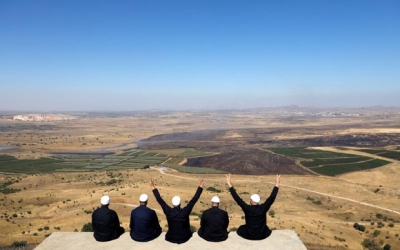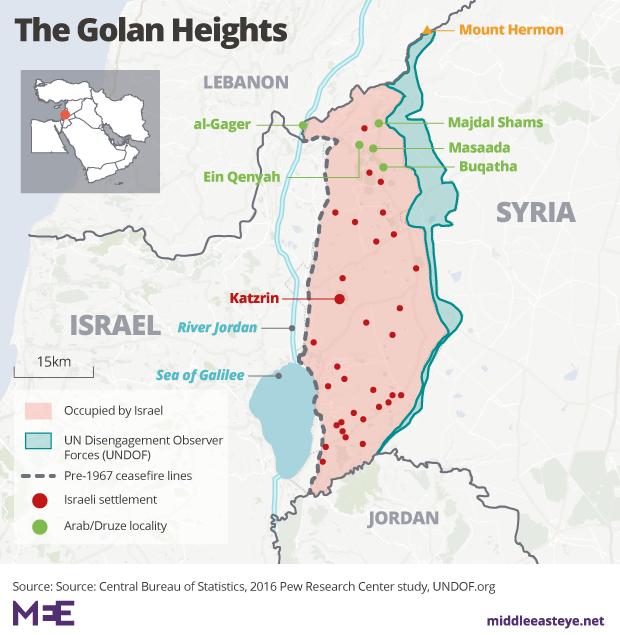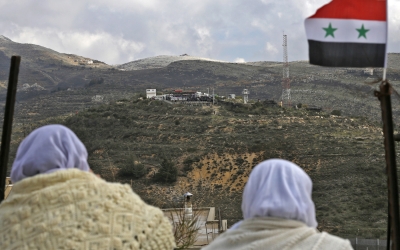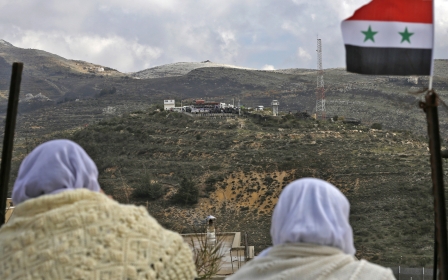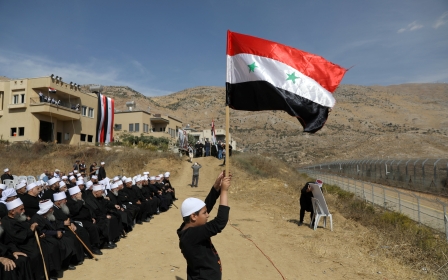Syrians in Golan Heights remain unmoved after Trump 'sovereignty' tweet

US President Donald Trump used his Twitter account on Thursday to send another shockwave across the Middle East when he declared the United States should recognize Israeli sovereignty over the Occupied Golan Heights.
Going against six decades of US foreign policy in the region, Trump tweeted that such a move was of "critical strategic and security importance to the State of Israel and Regional Stability!"
Unsurprisingly, Israeli Prime Minister Benjamin Netanyahu, who faces a tough election battle in just a couple of weeks' time, was highly appreciative of Trump's support, directly thanking him after the announcement.
"President Trump has just made history. I called him. I thanked him on behalf of the people of Israel. He did it again," Netanyahu exclaimed.
Meanwhile, local residents of the occupied Golan Heights generally remained unphased and ultimately unsurprised by Trump's announcement.
New MEE newsletter: Jerusalem Dispatch
Sign up to get the latest insights and analysis on Israel-Palestine, alongside Turkey Unpacked and other MEE newsletters
Wesam Sharaf, a 25-year-old law graduate who lives in the Golan Heights was shocked at first by the news, but soon realised that a tweet could do nothing to change his Syrian nationality.
“My first reaction was ‘oh my God, this is going to be terrible for us,’ but then I realised it has no practical impact on our lives,” Sharaf told Middle East Eye.
Born and raised in Ein Qiniyye in the Golan Heights, Sharaf has a deeply rooted Syrian identity.
“We are the people who decide which identity is ours; we don’t need some American president, who I’m pretty sure has never heard about the Golan Heights until last week, to decide for us who we are.”
Wael Tarabieh, the manager of economic, social and cultural rights programmes at Al Marsad, a human rights organisation, believes it was expected Trump would make this announcement at some point in time.
“The Israeli side [has been] working very hard to get this announcement from the US administration,” Tarabieh explained.
“His tweet or announcement talks more about the US administration than it talks about our cause or us… because it’s in contradiction to all the UN resolutions and decisions.”
Under UN Security Council Resolution 242, Israel's occupation of the Golan Heights is illegal.
Under this resolution, territory acquired by Israel in the 1967 war was not recognised, and Syrian sovereignty - in the case of the Golan Heights - was to be respected.
Twenty-two- year old student and activist, Aram Abu Saleh, told MEE it is "devastating" to have Israel constantly supported by the US in all its international law violations.
"It's very annoying having someone sitting on the other side of the world, saying something about your destiny," Abu Saleh told MEE.
Netanyahu election support
Each person who spoke to MEE from the occupied Golan Heights believed Trump’s announcement was orchestrated to back up Netanyahu to win another term in the upcoming election on 9 April.
“It gives him more points, he’s getting the world to recognise Israel’s control over occupied territories,” Abu Saleh said from Majdal Shams, one of the last remaining Syrian villages in the Golan Heights.
“It’s very good in the Israeli public [eye].”
As the Israeli election approaches, right-wing parties have gained traction across the local population, as they attempt to show how committed they are to the idea of the state.
Tarabieh explained the political parties are taking advantage of the public’s concern for securing the longevity of Israel.
“Every party will show they are more committed than others to try and keep the Golan,” Tarabieh said.
Jerusalem repeated
Sharaf pointed out that when Trump moved the US embassy from Tel Aviv to Jerusalem last year - also violating international law and going against previously held US policy - the majority of the international community condemned the move.
“The same is happening now. When he tweeted [about Golan], the EU, Russia, the UK all condemned his decision, and they said they see this area as Syrian,” Sharaf said.
He believes that this decision is therefore irrelevant, seeing as recognising sovereignty requires a global majority.
“This only isolates the US policy in that matter from the rest of the world.”
The Golan Heights: Why it matters
+ Show - HideOfficially part of Syria since the country’s independence in 1944, the Golan Heights is a strategic plateau straddling Israel and Syria and overlooking southern Lebanon.
It was captured by Israel during the Middle East war of 1967 and subsequently annexed in a move never recognised by the international community.
The Golan is recognised as part of Syria by the United Nations. UN Resolution 242 calls for Israel to withdraw from the Golan and other occupied territories including the Gaza Strip and the West Bank.
However, Israel has repeatedly refused to do so and in 1981, it formally annexed the Syrian territory.
A UN peacekeeping force has patrolled the demarcation line between Syrian and Israeli-controlled areas of the Golan since 1974.
Israel has constructed settlements that are illegal under international law in the occupied territory and settled its citizens there.
Some 20,000 Israeli settlers currently live in the Golan, alongside around 26,000 of the territory’s native inhabitants, who are predominantly Druze and identify as Syrian.
Since the Syrian war erupted in 2011, Syrians in the Golan taking Israeli citizenship has become more common, though the vast majority reject it.
The Golan is thought to provide around one-third of Israel's fresh water supply. Water from the territory flows into the Sea of Galilee and Jordan River.
Other than its strategic significance - the Golan is the only land border between Israel and Syria - the territory is also used by Israelis for leisure purposes. The area counts an Israeli ski resort and several vineyards.
Tarabieh reiterated this sentiment and is reassured that Trump’s decision won’t yet change the status of the Golan Heights.
“Not Donald Trump, not anybody else can decide by themselves the fate of the Golan Heights in such an easy way, via Twitter,” Tarabieh said.
While the Syrians of the Golan Heights can take up Israeli citizenship and passports, the majority of the population continue to reject this offer.
Even though moves like Trump’s declaration of Israeli sovereignty over the region may perpetuate a decrease in the hope of ever returning to Syrian hands, those who have previously rejected citizenship are unlikely to now.
Abu Saleh sees an overall lack of hope of anything changing in the Golan, but is confident no one will take up Israeli citizenship because of Trump's announcement.
“I don’t think anyone is taking it very seriously right now because it’s just an announcement, it’s not something practical, our lives aren’t changing right now.”
Politics over security
Following Israel’s continued narrative that the Golan Heights is a crucial buffer zone from the threat of Iranian activity in Syria, Trump stated in his tweet that the region is “of critical strategic and security importance to the State of Israel and Regional Stability!"
Sharaf flatly expressed he didn’t understand this rhetoric.
“We are talking here about a state who... kills daily in other areas it controls militarily,” he said, referring to Palestinians killed by Israeli forces.”
“So the security of the State of Israel... ignores the security of the... residents in [it’s other occupied] areas.”
He continued by saying that in his 25 years of living in the Golan Heights, he had never seen a “bullet flying in any direction” near the demilitarisation zone between the Golan Heights and Syria.
“I’m guessing it has more political than security reasons,” Sharaf concluded.
Taking advantage of the Syrian War
Tarabieh expressed the view that Israel has been taking advantage of the proxy war in Syria for years, continuing its Jewish settlement programme and occupation policies in the Golan Heights.
He believes the Israeli policies on the ground in the Golan Heights are far more concerning than Trump on Twitter.
“What’s more dangerous is the de facto policies on the ground… such as the new project from Israel to bring 100,000 new settlers within the next five to 10 years,” Tarabieh explained.
He also pointed to continued resource exploitation and the setting up of wind farms on native Syrian agricultural farms.
But due to the ongoing instability in Syria, the likelihood of the Golan Heights rejoining Syria anytime soon is slim.
Tarabieh believes the Golan Heights return to Syria will be dependent on one condition.
“It will be possible and maybe real when there will be a kind of democratic state or government in Syria,” Tarabieh hypothesised.
“Only a democratic state will work to regain this occupied territory.”
Considering Syrian President Bashar al-Assad has now retaken control over much of the Syrian territory, eight years after protests escalated to remove him from power, democracy seems far from sight.
Abu Saleh highlights that not only Assad but also his father, who was the Syrian President for the 30 years before him, has never cared about the Israeli occupation of the Golan Heights.
“They just use us in propaganda, they never do anything really to help us against the occupation,” Abu Saleh said.
“I think as long as Syria is under his control, no one will be free, not the Golan or any other Syrian.”
This article is available in French on Middle East Eye French edition.
Middle East Eye delivers independent and unrivalled coverage and analysis of the Middle East, North Africa and beyond. To learn more about republishing this content and the associated fees, please fill out this form. More about MEE can be found here.


